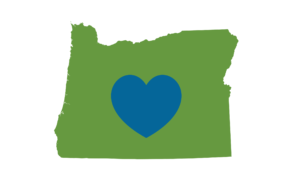November 10, 2021
Cascadia Adopts Land Acknowledgment
 Cascadia is officially rolling out a land acknowledgment statement recognizing that our organization exists on land that was taken from Indigenous people. The rollout of the land acknowledgment coincides with Native American Heritage Month in November.
Cascadia is officially rolling out a land acknowledgment statement recognizing that our organization exists on land that was taken from Indigenous people. The rollout of the land acknowledgment coincides with Native American Heritage Month in November.
This statement will be read at the beginning of public events organized by Cascadia, as well as be readily available to employees and the public.
Cascadia’s Equity, Diversity & Inclusion Department worked with Sidney Morgan, M.A., on the development of our statement. More information on Sidney can be found at www.redsearoadconsulting.com.
What Is the Purpose of Land Acknowledgment?
It is almost certain that, if you are living in the U.S. (or nearly any country with a history of colonization), you are living on land that settlers took by force from Indigenous people. You may not have taken it yourself, you may have paid for it, but you are still receiving stolen property. We wish to acknowledge the land of all the Indigenous peoples that has been taken from them/us, by theft, by forced treaty or sale, or by any other means.1
Land acknowledgments are a first step in bringing Native/tribal/First Nations people who have historically been hyper-invisible and prehistoric into the present time. Native/tribal/First Nations people are here, present, strong, and alive. The “stock story” told in our current U.S. historical context tells a history shrouded in lies; the “concealed stories” need space to be told by Native/tribal/First Nations people.
Land Acknowledgments can be a first step, but are in no way the same as giving stolen land back to Native/tribal/First Nations people. Some efforts have recently been made with #Landback activism, but we are not done. We must first acknowledge that land was stolen and begin the long journey of reckoning with white supremacy and its long history of destruction.
1 Native Land Acknowledgments Are Not the Same as Land, Wallace Cleaves and Charles Sepulveda
Cascadia Land Acknowledgment
Every community owes its existence and vitality to generations from around the world who contributed their hopes, dreams, and energy to making the history that led to this moment.
Some were brought here against their will, some were drawn to leave their distant homes in hope of a better life, and some have lived on this land for more generations than can be counted.
Truth and acknowledgment are critical to building mutual respect and connection across all barriers of heritage and difference.
We begin this effort to acknowledge what has been buried by honoring the truth. The Native communities in Portland and Vancouver, Washington number over 70,000 strong and are descended from over 380 tribes.
We are in the ancestral and occupied lands of the Multnomah, Wasco, Cowlitz, Kathlamet, Clackamas, Chinook, Tualatin Kalapuya, Molalla, and more who may call this place home. We pay respects to the elders past and present.
Please take a moment to consider the many legacies of violence, displacement, migration, and settlement that brings us together here today.
Our land acknowledgment evolves as our own understandings of our work in solidarity to indigenous struggle grows. The land acknowledgment text is adapted from recommendations found in the USDAC guidebook on honoring native land, which can be found at https://usdac.us/nativeland with Portland-specific information found at http://www.up.edu/activities/files/leading-with-tradition.pdf.
